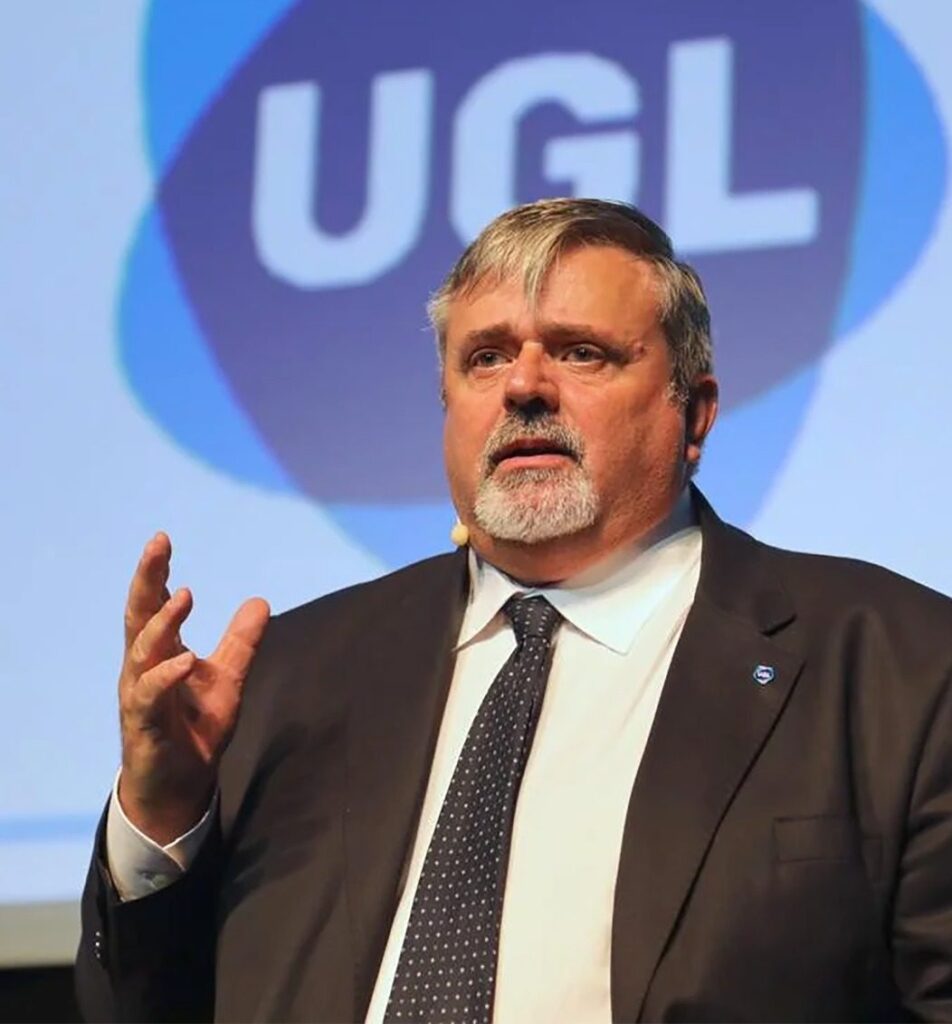Francesco Paolo Capone has been a trade unionist and general secretary of the Unione Generale del Lavoro (UGL) since 2015. In 1982, he took part in the ‘Lebanon 2’ mission in Beirut as a parachute non-commissioned officer in the San Marco Battalion. After leaving the army, he was a bank clerk and became a trade unionist, becoming provincial secretary of the CISNAL trade union in 1987. When CISNAL became UGL in 1997, he became manager of the cadre training office. Capone was elected General Secretary of the UGL in October 2014 and has revalidated his position at the various congresses held by the union. Capone recently offered his vision for the UGL in the following interview.
The General Union of Labour, which is 73 years old and has about two million members, is formally a trade union confederation like any other. It brings together trade unions of the various categories (metalworkers, chemists, etc.), has territorial structures, and participates in the election of union representatives in the workplace. But unlike the other three confederations, it pursues the definitive overcoming of the political conception of social class and its ideological consequences, and seeks instead to facilitate the co-responsibility of workers in the choices of the company.

Throughout the world, work has lost its centrality: finance, real estate, land income, and consumption have formed the fragile foundations of an unsustainable economic system which, over time, has created serious injustices. A change of mentality is therefore needed. Or, to put it better, a true and proper conversion is needed: recovering the centrality of the person who works. This means one precise thing: unlike what has been preached for years, we are in a phase in which it is first necessary to produce wealth, quality, research, integration, and value; and only then consume. A phase in which finance must be brought back to its social (and not speculative) function: to be a tool for building the future. To achieve this turning point—which must involve the heart as well as the head—it is necessary to go back to thinking that work can never be reduced only to its instrumental dimension (although that is an essential component). In an advanced society, work should rather be understood in its anthropological breadth, that is, as a full expression of human capabilities.
In the official communication, CGIL, CISL, and UIL make an effort to show a total closure to and refusal to have any relations with the UGL. This is their ideological position. In reality, the UGL sits next to the CGIL, CISL, and UIL whenever the government confronts the unions. In many corporate disputes, the UGL, CGIL, CISL and UIL act together in a coordinated manner.
The UGL is fully funded by the workers with 1 percent of their wages. In Italy the centre-Left has facilitated and financed the other unions in every way, but we have never benefited from state prebends. You ask me if the UGL could become the majority trade union in Italy. Who knows? Let’s not set limits on the future. For now we are content to record a significant and constant increase in the number of our members while the other unions complain of decline.
Indeed, many wealthy people in Italy vote for left-wing internationalist parties. By now, election after election, leftist parties are only successful in the affluent neighborhoods of cities.
The new government has only been in office for 6 months and has inherited a terrible situation even after the pandemic, not to mention one of the highest public debts in the world. Nonetheless, it is sending positive signals to workers. For example, on April 11, the government approved a €3 billion cut in the tax wedge for low- and middle-income workers. The trade unions are regularly summoned and given a fair hearing. But the left-wing trade unions take up an ideological position and blame this government for everything they turned a blind eye to when their friends governed.
Not only with MOSZ in Hungary and Solidaridad in Spain, but also with Union Blue in the UK and Meridian in Romania, we have an excellent collaboration that derives from a common feeling of solidarity. The manifesto that we signed in Brussels contains many points that we all share, in particular a refusal of class struggle. Instead of class struggle, we advocate for the participation of workers in the management of companies, and the defense of a dignified life with a salary, stability, and working conditions that allow for a decent home, a family, and an adequate pension.
Patriotic and conservative parties in some countries were born with a vague liberal idea. Only later did they realise that—as we said before—the wealthy are well-represented by liberal internationalists, and that their own voters are largely wage workers. And they are taking measures accordingly: in Spain, VOX has favoured the birth of Solidaridad; in the UK, the Conservative Party has promoted Union Blue; in Hungary, MOSZ is very close to Orbàn; in Romania, Meridian has excellent relations with AUR. Now in Portugal, CHEGA is planning a union. The same is being done by the Rassemblement National in France. It seems to me that we are on the right track.
